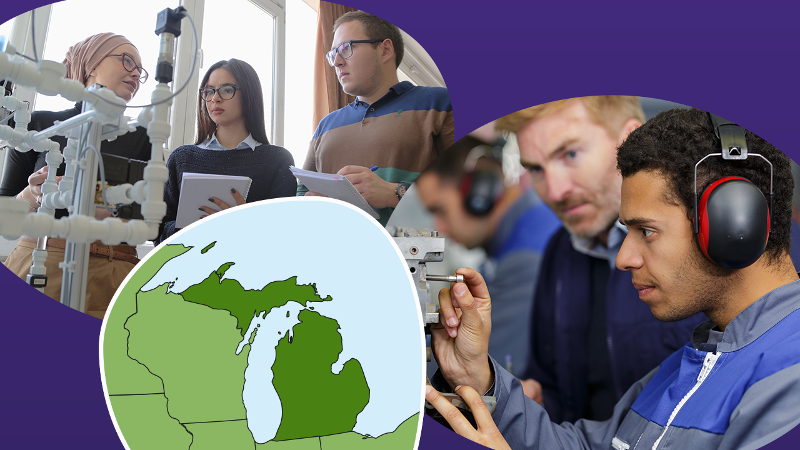Improving Michigan’s Postsecondary Career & Technical Education

Project Name
Michigan Career & Technical Education
Project Description
This project brings together a dedicated team from CAST and MaxKnowledge, the creators of CTE Learn, to lead a three-year initiative to expand, evolve, and improve postsecondary career and technical education across the state of Michigan. Together, CAST and MaxKnowledge will leverage their robust experience in CTE and postsecondary learning to achieve the following objectives:
- Conduct a professional development needs assessment and establish systemic CTE-specific postsecondary professional development goals
- Develop, deploy, and evaluate meaningful, research-based CTE and postsecondary-specific, professional development offerings
- Establish a sustainable professional development strategy and equip Michigan’s Department of Labor and Economic Opportunity (MI LEO) workforce development team to lead this work at the end of the grant period.
Through CAST’s strategic partnership with MaxKnowledge, all full-time postsecondary career and technical educators across the state of Michigan will have access to the Michigan CTE Learn portal containing an extensive library of over 180 research-based professional development credit-bearing courses. CTE Learn was established by the Association for Career and Technical Education (ACTE) and its alliance of unified state partnerships, including the state of Michigan, in partnership with MaxKnowledge.
This initiative will improve career and technical education across the state of Michigan by developing a shared professional development vision and establishing, through Universal Design for Learning (UDL), a common student-centered language through which educators, administrators, and state leaders can continue to assess and refine curriculum, teaching practices, materials and programs for years to come.
It is our experience that UDL resonates with CTE teachers, the majority of whom come to teaching from industry because key concepts—such as relevance, mentorship, and autonomy—already align closely with the teaching strategies in CTE classrooms and because CAST uses a co-design model that places educators needs and expertise at the forefront of the project. UDL is also empowering for CTE educators because it equips them with research-based strategies they can use to talk with each other about learning and teaching whether or not they have the same pedagogical knowledge as their peers.
UDL is at the heart of this initiative—thereby ensuring equity is at the forefront of all decision-making regarding CTE professional development and programming. Additionally, UDL is highlighted in Perkins V. As such, this project aligns with the goals of Perkins V funding. Through the UDL lens, CAST trainers will envision, with CTE educators and leaders, what it means to move from a school/campus-centric to a learner-centric model - one that is focused on accessibility, equity, inclusion, flexibility, and student engagement. Using a co-design model, we will empower educators and administrators to apply UDL principles to their CTE environments, and we will provide tangible strategies they can use to put these principles into action.
Timeline
2023 – 2026
Funder
Michigan Department of Labor and Economic Opportunity
Partners
Project Leadership
Amanda Bastoni, Project Director, CAST
Donald Walker, Project Lead CAST
Keenan Wade, Program Manager, Michigan Department of Labor & Economic Opportunity
Contact
For more information about this project, please email Monica Pascoa.
